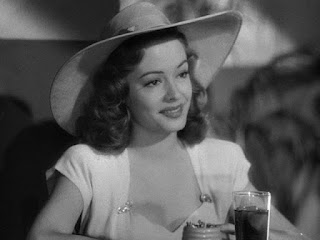 |
| Linda Darnell and Rick Jason |
Vida Dove (Linda Darnell) lives with her sister, Evelyn (Fatih Domergue) and brother-in-law, Murray (Dan Duryea), and their two small and adorable children. Vida was originally Murray's girlfriend, but he married Evelyn instead and the two formed a dance team until Murray was in a car crash. Now a bitter and often nasty paraplegic, Murray owns a coffee shop where the two sisters are waitresses. Vida has been engaged for several years to a likable lunkhead named Eddie (Hal Baylor), but one day Eddie brings a handsome friend, Glenn (Rick Jason) into the restaurant with him. Suddenly all of Vida's romantic fantasies center on Glenn, but she may have to contend with her own sister's desires just as she had once before, all leading up to one unspeakable act ... The fascinating and unfairly forgotten This Is My Love combines seriously dysfunctional families, unrequited love triangles, sibling rivalry, twisted passions, extreme loneliness and jealousy, and even cold-blooded murder into an absorbing and unpredictable 90 minutes of melodrama. The movie and the performances are on occasion more overwrought than they need to be, but given the situations and the raw emotions they engender that can certainly be forgiven. Linda Darnell gives an excellent performance, and a highlight is an absolute meltdown she has when she realizes she may again have to take a back seat to her sister. Although comparatively inexperienced next to Darnell, Rick Jason (of TV's Combat) not only looks swell but is right up there with his more famous co-star in the scenes they have together. (I confess that while |I watched this movie, I was convinced that Glenn was being played by serial star Judd Holdren, who is also in the movie, and who greatly resembles Rick Jason. Apparently Holdren has the very small role of a doctor; I blinked and missed him.) Domergue [Young Widow] is also very effective as the not necessarily bad but clueless sister, and Dan Duryea almost walks off with the movie as the crippled man who loves his wife desperately but is also so terrified of losing her that he takes it out on everyone around him. Hal Baylor makes the most of his role as nice guy Eddie, whose only crime is that he's just not the romantic figure of Vida's dreams. William Hopper of Perry Mason fame shows up briefly as a district attorney, and the little boy is played by Jerry Mathers of Leave It to Beaver fame. Franz Waxman's score features an excellent opening theme that underscores Vida's romantic thoughts and is nicely warbled at one point by Connie Russell [Nightmare].
Verdict: While many things are left unsaid and unexplored -- let's not forget there are children involved -- and this is not exactly Clifford Odets, it is still a highly interesting and worthwhile picture. ***.




























